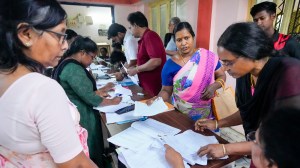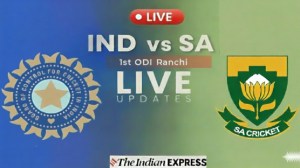People have never been able to associate themselves with any other leader as they did with Indira Gandhi
In this Idea Exchange moderated by Senior Editor,Media,Archna Shukla,Information and Broadcasting Minister Ambika Soni spoke about...
In this Idea Exchange moderated by Senior Editor,Media,Archna Shukla,Information and Broadcasting Minister Ambika Soni spoke about regulating the broadcast sector,the growing number of channels,the Emergency and Indira Gandhi.
Archna Shukla: What are the biggest challenges you see for yourself as I&B minister?
There are three distinct wings of our ministry: The print media,the electronic broadcasting sector and the film sector. The first challenge concerns the broadcasting sector. There is an ongoing debate since 1997 on whether we need any kind of government control or regulation in the broadcasting sector or should it be self-regulated.
As an individual,as an activist,I am for self-regulation because anything else would then have to be monitored too. But its easier said than done because there are two competing demands. One,by the broadcasting sector which advocates self-regulation. On the other hand,you have reports by MPs strongly recommending that we should not let it be completely free. We have started a debate. Two senior I&B Ministry officersSecretary and Additional Secretaryare interacting with representatives of broadcasting organisations and I think theyve made some headway. Now they are planning to meet with NGOs,womens organisations,civil society groups and to look at reports made by parliamentarians at different times and at the attempts made by different governments across the political spectrum with regard to the broadcasting sector. Im not putting any time frame on this exercise. All of us in the ministry are committed to openness. The prime minister has said that we are for an open and liberal society. But 26/11 has not faded from our memories yet and people have some different views on how we handled the incident,especially the broadcasting sector. I have one or two personal points,though I dont want to impose them. My personal opinion is that we are all for self-regulation but there needs to be a mechanism,a system,a bodyI dont want to call it the regulatory body or a broadcasting regulatory authority because people associate it with some kind of content controla mechanism which addresses broadcasting concerns.
Pranab Dhal Samanta: Whenever there is a crisis,the flow of information is extremely poor from the governments side. You dont have designated spokespersons and if you do,they are not well-informed. What exactly is the problem?
I am already writing a letter to the PM on this issue. I do feel that there is no one individual today who can effectively be the sole spokesperson. There has to be an empowered group,a nodal group. I have suggested that the group comprise the home minister because he has an overall view of security,the concerned minister because each time an emergency occurs it concerns a different ministry. Then there can be one or two officials designated by the PM. I have discussed this twice with the PM. He seemed to be very open to the suggestion. I discussed it with the home minister,who too felt that this was a way forward.
D.K. Singh: There are reports that your ministry is desperately trying to stop the film on Nehru and Edwina from being made.
I dont think our ministry has been desperately trying to stop this film at all. There is a mechanism in place: according to the law of the land anybody from outside who wants to make a film on India has to get permission. As far as this film is concerned,it is based on a novel which has not been certified as a work of history,its fiction. When you have references concerning people who have iconic status in this country,you have to be extra-careful. Its not a question of censorship. Youve had films made in this country which have been a little avant-garde and youve seen the fallout. The filmmakers wanted to make the film more about the private life of individuals,in this case two known individuals. There were three or four references which the producers have been asked to eliminate. Once they agree to those,there is a format which they have to sign,because once they make the film,it has to be viewed to see if it was made according to the approved script. That format was never filled by the producers of this film. They have written to us saying that because of the global meltdown they have decided to shelve the film and later on they felt that if those three or four references were not going to be in the film,then the very objective of making a film was defeated.
Shailaja Bajpai: Successive governments since 1997 have looked at regulating the broadcast sector but nothing has materialised. You are also not putting any time frame on when a mechanism can be put in place. Why has nothing happened in 12 years?
Mainly because technology has advanced very fast. In 1997 there was a Broadcasting Bill. By 2001-02,there was another government and an opinion that there ought to be a Convergence Bill. Then a high court judgment said we need to have some kind of mechanism to control the airwaves. Things have changed fast. Today,official permission has been given to over 500 channels. We have written to the TRAI chairperson because we wonder how long we can go on giving permission. Also,we have had complaints from various states and districts that some channels that we dont get to see in metro cities sometimes get their work done by what they broadcast and what they dont broadcast. They use them for arm-twisting. Then,there are some channels that employ young people from various schools on low salaries and then decide to shut shop when their purpose of being a channel has been served. I felt that these were also responsibilities that should be looked at. We have written to TRAI asking if we shouldnt look at demanding additional qualifications for people wanting to run a channel. Meanwhile,we are taking some proactive steps alongside this open-ended discussion. It is open-ended because of the sensitivities of the broadcasters and because in the recent past,some organisations have come into being,like the NBA (News Broadcasters Association),and IBF (Indian Broadcasting Federation),that have shown a desire to self-regulate. I havent hidden that the ministry would like some kind of a mechanism in place. I havent set any time frame,but that doesnt mean that if I am going to last here for one year or two years,I am going to leave it for my successor. The number of meetings weve had shows the seriousness of the discussion this time.
D.K. Singh: We heard that some Congress MPs complained to you about corruption in news channels and that you launched a crackdown.
No Congress MP has approached me either for channels or against them. But I was getting to hear that channel kholna ek dhanda ho gaya hai (launching channels has become a kind of business). I felt that since there are so many channels,there might be something behind so many people wanting to launch channels. Ive had 40 years in public life and I take pride in the fact that transparency is very important to me in public dealings. At I&B,whether its the ads policy,DAVP,the broadcasting sector or giving empanelment to newspapers,it will be transparent.
Shekhar gupta: What is your view on politicians launching newspapers and news channels,particularly politicians in power?
There is no ban. It is not that politicians should or should not open channels. Its a question of expertise. You must have some experience. If you want to become a broadcaster,then you must know something about broadcasting. Im not the one to say politicians should not go into the broadcasting business. If a political person,irrespective of his political affiliation,has experience in the media,then why notthere are politicians who come from the media world too. Im not being defensive but I dont think this could be a criterion for stopping people because that would be an infringement of their personal rights.
Archna Shukla: The insistence on letting broadcasters decide what is right and wrong is like asking the aggressor to be his own judge.
The self-regulatory system will allow broadcasters to address concerns among themselves. If they are not able to,then there should be a mechanism which addresses broadcasting concerns. So there should be a dual regulatory system.
Shekhar Gupta: Is there any thought given to lifting the ban on Pakistani TV news channels,at least selectively?
No,I cant do it. Its the Home Ministrys call. I have written to the home minister again because they are the ones who have to give the clearance. There are some cable operators who are showing some channels which are not officially allowed. I have written to Shri Chidambaram to take a considered view on the subject of cable operators broadcasting illegal channels.
Coomi Kapoor: Has the ministry looked at the danger of media monopolies and cross media holdings?
There are some regulations being suggested by TRAI to prevent cross holdings and therefore monopolies. If we have a mechanism/ body,then all these concerns could be addressed by it as and when they come up. In the absence of a broadcasting body,all these issues remain unaddressed by default.
Seema Chishti: Youve been a key player in the Congress,a key part of Mrs Sonia Gandhis office. You are also a minister. What is real political power about? Is it when you were out of office or when you are in government?
I am an organisation person. I joined the Congress in 1969,40 years ago. Indira Gandhi had inspired a whole generation. As a Congress activist,I used to watch Congress leaders like S.B. Chavan,Babu Jagjivan Ram,Swaran Singhji come for meetings. It used to be my ambition to be a member of the Congress Working Committee. I never thought of ministership. But I know there is a life-span in the organisation. Even though I was offered ministership in 2004,I chose to work for the party. But in 2006,my time was probably up in the party,so I was made minister of Tourism and Culture. I gave it my best shot and was happy when my work was recognised.
vinay sitapati: You were once a protégé of Sanjay Gandhi…
I wasnt a protégé,he was a colleague. I was the Youth Congress president and I must give it to him that he did not cross the line,that he gave respect to every single Youth Congress office bearer.
Coomi Kapoor: Looking back 25 years,what is your assessment of the events that took place then?
Its the 25th anniversary of Indira Gandhis assassination. I dont know how its going to be projected. Differently,I suppose,at different places. We in the Congress acknowledge her indelible imprint on the party. She stood for socio-economic justice,for secularism,she nationalised banks to give the young entrepreneur a level playing field,she brought in the Green Revolution and much more. She did not only have a national presence but emerged as a global figure. I can recall small incidents: my husband was posted in a foreign country and she was passing through. I wanted to gift her an orchid because she was going to a Scandinavian country. We looked all over but shops were closed. Some friends rang up a florist and said it was for Indira Gandhi and that florist,in a western European country,opened his shop and made a corsage with two orchids and said it was his gift to Indira Gandhi. I think 25 years down the line,she can be viewed better by the younger generation because they would be more objective.
Monojit Majumdar: Are 25 years long enough for the Congress to realistically assess Indira Gandhis legacy?
I dont know. For Congress the pluses are so much weightier,whether you look at the Green Revolution or at her being called Durga by Atal Bihari Vajpayee,her role in the international arena or her leadership in the non-aligned world. The way the poorest of the poor of this country,the illiterate and literally the hapless,identified with her. People have never been able to associate themselves with any other leader as they associated themselves with Indira Gandhi. When you look at her dedicated work towards a socialist society,towards empowerment and inclusive growth today,it has its genesis all at that time. If you talk about the first Pokhran test or progress made in the atomic arena,so much credit accrues to her. After the Emergency,we all lost,Congress won two seats in northern India. Even at that time when the country had voted the Janata Party in and defeated Congress,people on the road said Indira Gandhi ko nahin haarna chahiye tha.
Pranab Dhal Samanta: Was the Emergency a mistake according to you?
Well,Mrs Gandhi herself said that this is a bitter pill and not to be repeated for a 1,000 years. Even after we lost,we introspected. It was very different at that time because one was too involved in the whole process.
Monojit Majumdar: Was Indira Gandhi the best PM the country has had?
Its very difficult to compare personalities. Each leader has his or her own set of challenges because generational aspirations change. You judge leaders as to how they respond to those aspirations.
Raj Kamal Jha: You worked with her for so many years,is there something about her you miss in the party?
I think Indira Gandhi had an incredible capacity of disarmament. She used to disarm people. I have seen Pilu Modi and Bhupesh Guptaji,venerated parliamentarians and personalities in the political arena,go and meet her and come out,for that little while totally charmed. She also had an incredible capacity to identify with the party worker. She would say,Ambika kaisi ho? Ladka school mein theek hai? Your husbands job is ok? You felt as though youd got the world. I used to see her interact with people and the very fact that she would make eye contact or that she would personally acknowledge their presence made a world of difference to them. Then the party becomes a large,extended family.
Raj Kamal Jha: Youve worked closely with both Indira Gandhi and Sonia Gandhi. What are the similarities?
Its very difficult to compare two personalities. The whole atmosphere that Indira Gandhi grew up in was different. The journeys of the two leaders have been very different. But both have arrived at winning the confidence and love of the people. Look at Sonia Gandhi when she attends a public meeting. I have accompanied her on two visits when there was a cyclone in Orissa and when there was an earthquake in Gujarat. Ive seen people cling on to her as if they were clinging on to Indira Gandhi. Ive not seen her ever flinch. Theres an identification,also,on her part with the people. Its perfectly normal for her to touch the leg of a polio-ridden child and say ilaaj karana chahiye. So the end result is identification with the poorest of the poor.
Raj Kamal Jha: She has worked very hard on this?
No,its not about working hard. If it doesnt come naturally to you,you cannot do it. When she actively joined Congress in December 1997,the party was in a very difficult position. Nobody served the Congress leadership to her on a platter. During two Lok Sabha elections,we worked hard. She led and we got 114 and 140 seats. We lost some assembly elections in December 2003. But she didnt give up,like Indira Gandhi didnt give up after the defeat in 1977. She worked for the Lok Sabha election of 2004. She worked at opposition unity of like-minded secular forces and she brought an alliance into office despite the slogan of India Shining.
Transcribed by Pallavi Jassi



- 01
- 02
- 03
- 04
- 05




























